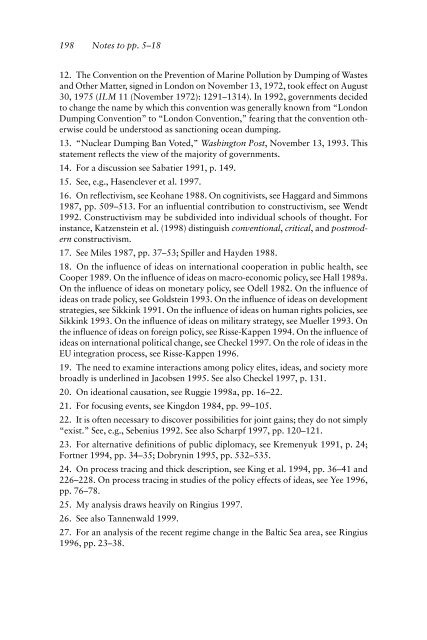Radioactive Waste Disposal at Sea: Public Ideas ... - IMO
Radioactive Waste Disposal at Sea: Public Ideas ... - IMO
Radioactive Waste Disposal at Sea: Public Ideas ... - IMO
You also want an ePaper? Increase the reach of your titles
YUMPU automatically turns print PDFs into web optimized ePapers that Google loves.
198 Notes to pp. 5–18<br />
12. The Convention on the Prevention of Marine Pollution by Dumping of <strong>Waste</strong>s<br />
and Other M<strong>at</strong>ter, signed in London on November 13, 1972, took effect on August<br />
30, 1975 (ILM 11 (November 1972): 1291–1314). In 1992, governments decided<br />
to change the name by which this convention was generally known from “London<br />
Dumping Convention” to “London Convention,” fearing th<strong>at</strong> the convention otherwise<br />
could be understood as sanctioning ocean dumping.<br />
13. “Nuclear Dumping Ban Voted,” Washington Post, November 13, 1993. This<br />
st<strong>at</strong>ement reflects the view of the majority of governments.<br />
14. For a discussion see Sab<strong>at</strong>ier 1991, p. 149.<br />
15. See, e.g., Hasenclever et al. 1997.<br />
16. On reflectivism, see Keohane 1988. On cognitivists, see Haggard and Simmons<br />
1987, pp. 509–513. For an influential contribution to constructivism, see Wendt<br />
1992. Constructivism may be subdivided into individual schools of thought. For<br />
instance, K<strong>at</strong>zenstein et al. (1998) distinguish conventional, critical, and postmodern<br />
constructivism.<br />
17. See Miles 1987, pp. 37–53; Spiller and Hayden 1988.<br />
18. On the influence of ideas on intern<strong>at</strong>ional cooper<strong>at</strong>ion in public health, see<br />
Cooper 1989. On the influence of ideas on macro-economic policy, see Hall 1989a.<br />
On the influence of ideas on monetary policy, see Odell 1982. On the influence of<br />
ideas on trade policy, see Goldstein 1993. On the influence of ideas on development<br />
str<strong>at</strong>egies, see Sikkink 1991. On the influence of ideas on human rights policies, see<br />
Sikkink 1993. On the influence of ideas on military str<strong>at</strong>egy, see Mueller 1993. On<br />
the influence of ideas on foreign policy, see Risse-Kappen 1994. On the influence of<br />
ideas on intern<strong>at</strong>ional political change, see Checkel 1997. On the role of ideas in the<br />
EU integr<strong>at</strong>ion process, see Risse-Kappen 1996.<br />
19. The need to examine interactions among policy elites, ideas, and society more<br />
broadly is underlined in Jacobsen 1995. See also Checkel 1997, p. 131.<br />
20. On ide<strong>at</strong>ional caus<strong>at</strong>ion, see Ruggie 1998a, pp. 16–22.<br />
21. For focusing events, see Kingdon 1984, pp. 99–105.<br />
22. It is often necessary to discover possibilities for joint gains; they do not simply<br />
“exist.” See, e.g., Sebenius 1992. See also Scharpf 1997, pp. 120–121.<br />
23. For altern<strong>at</strong>ive definitions of public diplomacy, see Kremenyuk 1991, p. 24;<br />
Fortner 1994, pp. 34–35; Dobrynin 1995, pp. 532–535.<br />
24. On process tracing and thick description, see King et al. 1994, pp. 36–41 and<br />
226–228. On process tracing in studies of the policy effects of ideas, see Yee 1996,<br />
pp. 76–78.<br />
25. My analysis draws heavily on Ringius 1997.<br />
26. See also Tannenwald 1999.<br />
27. For an analysis of the recent regime change in the Baltic <strong>Sea</strong> area, see Ringius<br />
1996, pp. 23–38.

















